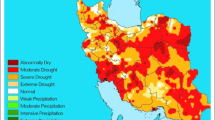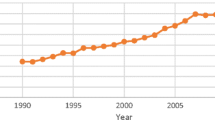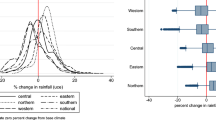Abstract
Mozambique has historically been prone to natural disasters due to its geographical location, but over the past 20 years the intensity and frequency of droughts, floods and cyclones has increased, negatively affecting the entire economy, particularly agriculture. These impacts are expected to worsen, as climatic conditions become hotter and drier. This study estimates the impacts of climate change on the agriculture sector and household welfare in Mozambique using a dynamic computable general equilibrium model. Specifically, the study investigates the impact of climate change on agricultural production, looking at implications for various crops and regions in the country. It also reports climate change impacts on both urban and rural household welfare. A probabilistic approach considering a distribution of climate shocks under two global mitigation futures (i.e. unconstrained emissions and level 1 stabilization) is used to evaluate the impacts of climate change on the economy, providing a range for the potential impact of climate change and the uncertainties related to it. Climate impacts are considered through five key channels: agriculture, roads, hydropower, sea-level rise and cyclones. The analysis shows that acute negative impacts are experienced in the agricultural sector, particularly for maize and cassava as crop yields decrease. Successful global mitigation efforts of reducing CO2 concentration to 560 ppm by 2100 (L1S) decreases the degree of uncertainty of the impact of climate change on the Mozambican economy, as the GDP is expected to increase up to USD 6.0 billion.








Similar content being viewed by others
Availability of data and material
Available if requested.
Code availability
Available if requested.
References
Aboumahboub T, Auer C, Bauer N, Baumstark L, Bertram C, Bi S, Dietrich J, Dirnaichner A, Giannousakis A, Haller M, Hilaire J, Klein D, Koch J, Körner A, Kriegler E, Leimbach M, Levesque A, Lorenz A, Luderer G, Ludig S, Lüken M, Malik A, Manger S, Merfort L, Mouratiadou I, Pehl M, Pietzker R, Piontek F, Popin L, Rauner S, Rodrigues R, Roming N, Rottoli M, Schmidt E, Schreyer F, Schultes A, Sörgel B, Strefler J, Ueckerdt F (2020) REMIND - REgional Model of INvestments and Development - version 2.1.0. https://www.pik-potsdam.de/research/transformation-pathways/models/remind
Arndt C, Strzepeck K, Tarp F, Thrlow J, Fant C, Wright L (2011) Adapting to climate change: an integrated biophysical and economic assessment for Mozambique Sustain Sci 6:7 – 20. https://doi.org/10.1007/s11625-010-0118-9
Arndt C, Thurlow J (2014) Climate uncertainty and economic development: evaluating the case of Mozambique to 2050. Climate Change 130:63–75
Arndt C, Thurlow J (2014b) A 2007 Social Accounting Matrix (SAM) for Mozambique. Washington, DC: International Food Policy Research Institute (IFPRI). http://ebrary.ifpri.org/utils/getfile/collection/p15738coll2/id/128888/filename/129099.pdf
Arndt C, Chinowsky P, Fant C, Paltsev S, Schlosser CA, Strzepek K, Tarp F, Thurlow J (2019) Climate change and developing country growth: the cases of Malawi, Mozambique, and Zambia. Climate Change 154:335–349
Brida A, Owiyo T, Sokona Y (2013) Loss and damage from the double blow of flood and drought in Mozambique. Int J Global Warming (IJGW) 5(4)
CARE (2016) Tracing agricultural policies to practices in Mozambique. CARE Internacional in Mozambique, Maputo https://www.care.org.mz/contentimages/3%20TECHNICAL%20BRIEF%20Tracing%20Sustainable%20Agriculture%20in%20Mozambique.pdf
CARE/ACTIONAID (2017) Policy analysis. Food security, nutrition, climate change resilience, gender and the small-scale farmers. Mozambique. CARE Internacional in Mozambique, Maputo. https://www.fanrpan.org/sites/default/files/publications/Mozambique%20FNS%20Policy%20Analysis%20Report.pdf
Costa C, Delgado C (2019) The cassava value chain in Mozambique. Jobs working paper No. 31. The World Bank, Washington, D.C. https://openknowledge.worldbank.org/handle/10986/31754
Diao X, Thurlow J, Benin S, Fan (2014) Strategies and priorities for African agriculture: economywide perspectives from country studies. International Food Policy Research Institute (IFPRI), Washington, D.C.
Dias P (2013) Analysis of incentives and disincentives for maize in Mozambique. Technical Note Series. MAFAP, FAO, Rome. http://www.fao.org/3/a-at575e.pdf
Donovan C, Haggblade S, Salegua V, Cuambe C, Mudema J, Tomo A (2011) Cassava commercialization in Mozambique. MSU International Development – Working Paper. http://doi.org/10.22004/ag.econ.120744
Intergovernmental Panel for Climate Change (IPCC) (2007) Climate change: the physical science basis. Contribution of Working Group I to the IPCC’s Ar4. https://www.ipcc.ch/report/ar4/wg1/
Institute for Securities Studies (ISS) (2010) The impact of climate change in Africa. Available in: https://www.files.ethz.ch/isn/136704/PAPER220.pdf
Instituto Nacional de Estatística – INE (2020) Indicadores básicos de agricultura e alimentação 2015 – 2019. Maputo – Moçambique
EPA [Environmental Protection Agency] (2019) Global change assessment model (GCAM). EPA, Washington, D.C. https://cfpub.epa.gov/si/si_public_record_report.cfm?Lab=OAP&dirEntryId=212503
Food and Agriculture Organization (FAO) (2018) Impacts of climate change on farming systems and livelihoods in the near East and North Africa. Available in: http://www.fao.org/3/ca1439en/CA1439EN.pdf
Food and Agriculture Organization (2020) Mozambique at a glance. http://www.fao.org/mozambique/fao-in-mozambique/mozambique-at-a-glance/en/
Kerry A, McLeod A (2001) Potential adaptation strategies for climate change in Scotland. Edinburgh. 82pp.
Ministério Para A Coordenação Da Acção Ambiental (MICOA) (2005) Avaliação da vulnerabilidade as mudanças climáticas e estratégias de adaptação. MICOA, Maputo
Ministério Para A Coordenação Da Acção Ambiental (MICOA) (2012) Estratégia Nacional de Adaptação e Mitigação de Mudanças Climáticas. Maputo
Ministério da Agricultura e Desenvolvimento Rural (MADER) (2020) Climate Smart Agriculture in Mozambique (Initiatives, programmes, priorities. Lusaka. https://www.ccardesa.org/sites/default/files/ickm-documents/Climate%20Smart%20Agriculture%20in%20Mozambique%20%28CSA%29.pdf
Ministério da Agricultura (MINAG) (2011) Plano Estratégico de Desenvolvimento do Sector Agrário (PEDSA). Ministério da Agricultura, Maputo
Ministério da Agricultura e Segurança Alimentar/MASA (2014) Plano de Acção para Adaptação da Agricultura às Mudanças Climáticas, 2015-2020. Maputo
Ministério da Agricultura e Segurança Alimentar/MASA (2016) Anuário de Estatísticas Agrárias 2015. Direcção de Planificação e Cooperação Internacional
Ministério de Agricultura/MINAG (2013) Plano Nacional De Investimento Do Sector Agrário. In: PNISA 2013–2017. Ministério da Agricultura, Maputo
Monjane R, King P, Rasmussen J (2018) Mozambique: Peasant farmers adaptation to climate change. https://viacampesina.org/fr/wp-content/uploads/sites/4/2018/06/report_mozambique_english_print.pdf
Paltsev S (2012) Implications of alternative mitigation policies on world prices for fossil fuels and agricultural products. UNU-WIDER Working Paper No. 2012/ 65, www.wider.unu.edu
Regional Network of Agricultural Policy Research Institutes – RENAPRI (2017) Unfolding agricultural transformation in Africa: strategies for sustainable development. Cape Town, South Africa
Ribeiro N, Chauque A (2010) Gender and climate change: Mozambique case study. Cape Town, South Africa
Salvador EM, Steenkamp V, McCrindle CM (2014) Production, consumption and nutritional value of cassava (Manihot esculenta, Crantz) in Mozambique. J Agr Biotech Sustain Develop 6:29–38
Smith JB, Lenhart SS (1996) Climate change adaptation policy options. Clim Res 6:193–201. https://doi.org/10.3354/cr006193
Uaiene RN, Arndt C, Masters WA (2009) Determinant of agricultural technology adoption in Mozambique. Discussion papers No. 67E. Ministry of Planning and Development, Republic of Mozambique
UKaid; World Bank Group; CGIAR; CCAFS (2017) Climate-Smart Agriculture in Mozambique. Available in: https://climateknowledgeportal.worldbank.org/sites/default/files/2019-06/CSA-in-Mozambique.pdf
van Ruijven B, Min J (2020) The MESSAGEix-GLOBIOM model and scenarios for transition risk analysis. IIASA Report. Laxenburg, Austria: IIASA
Webster M, Sokolov AP, Reilly JM, Forest CE, Paltsev S, Schlosser CA, Wang C, Kicklighter D, Sarofim M, Melillo J, Prinn RG, Jacoby HD (2012) Analysis of climate policy targets under uncertainty. Clim Chang 112(3-4):569–583
World Bank (2011) Climate risk and adaptation country profile - MozambiqueWorld Bank (2019) Disaster risk profile: Mozambique. https://www.statista.com/statistics/507266/mozambique-gdp-distribution-across-economic-sectors/
Youmatter (2020) Climate Change: Meaning , definition, causes, examples and consequences. https://youmatter.world/en/definition/climate-change-meaning-definition-causes-and-consequences/#:~:text=Climate%20change%20is%20the%20global,especially%20caused%20by%20human%20activities
Acknowledgements
We are grateful to the International Food Policy Research Institute for funding this study.
Funding
This study was funded by the International Food Policy Research Institute, Washington D.C., USA.
Author information
Authors and Affiliations
Contributions
Lourenço Manuel was the team leader of the study. Among other activities he was responsible for the abstract and section 4.
Orcídia Chiziane was responsible for sections 3 and 5.
Gaby Mandlate wrote the Introduction and section 2.
Faaiqa Hartley was responsible for model calibration and data analysis.
Emilio Tostão was responsible for technical revision of the manuscript.
Corresponding author
Ethics declarations
Conflicts of interest
The authors declare no conflicts of interest.
Additional information
Publisher’s note
Springer Nature remains neutral with regard to jurisdictional claims in published maps and institutional affiliations.
Rights and permissions
About this article
Cite this article
Manuel, L., Chiziane, O., Mandhlate, G. et al. Impact of climate change on the agriculture sector and household welfare in Mozambique: an analysis based on a dynamic computable general equilibrium model. Climatic Change 167, 6 (2021). https://doi.org/10.1007/s10584-021-03139-4
Received:
Accepted:
Published:
DOI: https://doi.org/10.1007/s10584-021-03139-4




